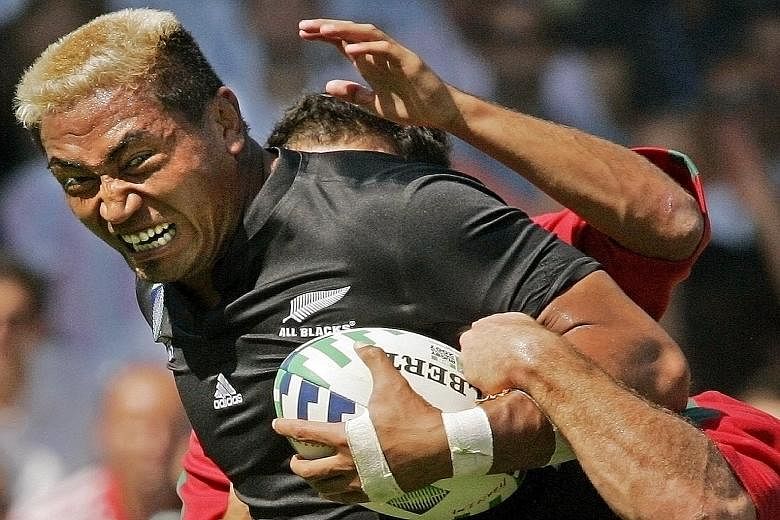Small in number, huge in size and spirit, Samoans are island people who run the gamut of life and sport.
Last month, they shared with New Zealand an emotional farewell to Jerry Collins, one of the true rugby union greats. He died in a horrific accident when his car smashed into a bus in southern France, killing him and his partner and injuring their baby daughter.
It is said that when emergency services reached the scene, they found him with his arms wrapped around his child, suggesting that he died trying to shield her.
Collins achieved world acclaim not with Samoa, but with New Zealand where, like many other gifted islanders, he represented the most powerful force in global rugby - the All Blacks.
He was 35 years old.
Prominent at his funeral was a cousin, Tana Umaga, the first Samoan to skipper the All Blacks.
The toughness, the speed, the movement of Polynesians have blended with the obsession that the All Blacks impose on the world - and who will defend the World Cup in Britain later this year.
Out of a nation of little more than 190,000 people, Samoa has provided New Zealand with some mighty All Blacks. They include Collins, Umaga, Ma'a Nonu, Sonny Bill Williams, Rodney So'oialo, Va'aiga Tuigamala, Julian Savea and many more.
Yet, despite the fact that New Zealand granted the Pacific islands independence in 1962 - and despite Samoa rising to ninth in the world rugby rankings - the first time that the two countries met on Samoan soil was on Wednesday.
Samoa laid down the challenge to New Zealand with their version of the haka, and the All Blacks accepted with their own world-renowned Maori war dance ritual. A maximum crowd of 8,104 packed into the stadium in Apia and the government declared Wednesday a half-day holiday.
The party before and after would have precluded work anyway. For, despite the fact that Samoan rugby (whose president is also the Prime Minister) is trying to live down its own variety of Fifa financial corruption, there were days and nights of celebration that, finally, the All Blacks had condescended to play in the islands where they draw some of their global omnipotence.
World Rugby assists Samoa with some S$1.35 million each year, but after half that sum went missing from the Samoan Rugby Union accounts over three years, the chief executive and high performance director quit in February.
Wednesday was about the game and not the money.
The last time that New Zealand played Samoa, in 2008, the score was 101-14 for the All Blacks.
Several reasons ensured that such overwhelming superiority would not happen on Wednesday.
For one thing, the Blacks were without a host of key men who had played in last weekend's Super Rugby final.
For another, the temperature in Samoa was hotter and significantly more humid than the frigid New Zealand winter.
The All Blacks turned up, but not in the strength that they will be at World Cup time in Britain. Samoa turned up, fired up and ready to go.
The All Blacks still won 25-16. The "brothers" - if that's what Samoans and New Zealanders so often are on the rugby pitch - battered and bruised one another in the fearful way that modern rugby is played.
Dan Carter's boot made the difference. Probably the world's best kicker, he landed six penalties and converted a try by George Moala. Samoa scored a try by Alafoti Faosilivia, Tim Nanai Williams converted it, and Tusi Pisi kicked three penalties.
The game that interrupted the party down in Apia ended with the All Blacks captain Richie McCaw saying on the field: "I'm not sure words can justify the type of match it was. I will say to the Manu Samoa team, the way you played is what true Test rugby is all about. We said before we came that was what we'd get, and that's what you boys did."
Some of Samoa's players had paid their own way from their European clubs to get home for this historic encounter. Another, the prop Census Johnston, came out of retirement to put his weight against the All Blacks.
"Thanks to Richie McCaw and the No. 1 team in the world," replied winger Alesana Tuilagi.
"I hope this is the start of a campaign where you come back," he added. "And we try again, and again, and again."
Samoa will play in Group B of the World Cup against South Africa, Japan, Scotland and the United States. They will be the minnows by population but scarcely in terms of physique or ranking.
The next time you are tempted to say that Singapore are too small to take on world champions in any chosen sport, think of Samoa.
Think of a nation who start with a population that would fit 28 times into the Singapore number - and then lose the best of their players to big brother New Zealand.
This week, the Samoans got stuck into the Kiwis. They went toe to toe, kilo for kilo, and very nearly score for score too.
It is, once more, the story of sport.
All teams start equal under the rules of the game, and given the courage and the ambition, a sprat can tackle a giant.


